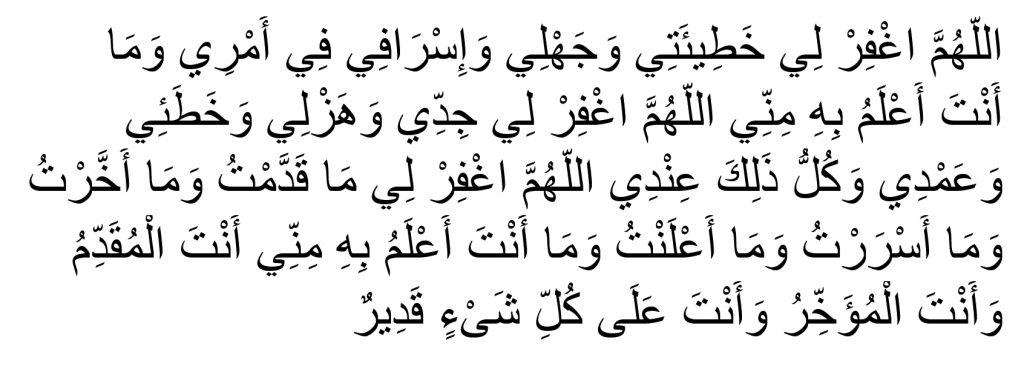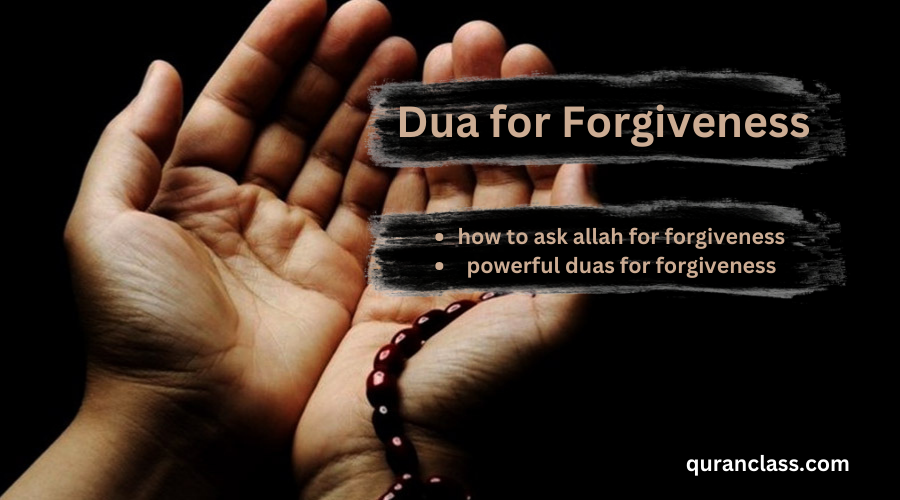The term “Dua” is Arabic for “invocation,” “prayer,” or “supplication.” In Islam, a dua is a prayer that is offered to Allah Almighty or a dialogue with the world’s creator. You must recall Allah and the benefits He has bestowed upon us by reciting dua for forgiveness from Allah every day at any time, but particularly before bed. This deed will help you receive huge blessings from God for this small deed. You must establish the practice of asking Allah for forgiveness before going to bed. We must all adhere to it since it is the Holy Prophet’s (PBUH) Sunnah.
Everybody makes errors and has flaws. How individuals can fix these faults is something we do not talk about enough. Not only do we need to ask for forgiveness when we believe we have committed a sin, but also at other times. You do not have to be aware of your transgressions in order to ask for forgiveness.
Thankfully, Allah has provided us Muslims with the Quran and Hadith, which include a variety of potent dua for repentance, requesting astaghfar. The door is always open to repentance. Do not wait until tomorrow to ask for forgiveness. Tomorrow is uncertain.
Reciting Astaghfirullah 100 times each day
The prophet Muhammad (PBUH) recommended reciting Astaghfirullah 100 times each day, which takes one or two minutes out of your day. One of the best dua for forgiveness is this short yet effective one.
The precise translation of Astaghfirullah is “I ask Allah for pardon.” It may also be employed to express shame. It entails being sincere with yourself and Allah and expressing regret for what you did.
How to ask Allah for forgiveness
There are three requirements for repentance for misdeeds, particularly those that violate Allah’s rights.
- The first criterion is obviously to refrain from doing the sin again.
- The second need is that the believer feels regret for his wicked conduct.
- The final need is to sincerely resolve not to repeat one’s conduct. True repentance requires all three of these prerequisites.
The aforementioned three requirements all unquestionably apply when someone repents for a wrongdoing that has to do with another person’s rights. The fourth condition is present as well, though.
4. Making apologies to the person who was hurt is primarily involved. When it comes to an item or piece of property that belongs to someone else, that person should get it back. The victim’s forgiveness must be asked for in the event of backbiting, in the meantime.
For the forgiveness of all of our sins, we must unquestionably offer dua. It is essential to make an appeal for the forgiveness of one’s remaining sins even when specific offenses can be atoned for with repentance.
The Prophet ﷺ said: “All the children of Adam constantly err, but the best of those who constantly err are those who constantly repent.”
[Tirmidhi, Ibn Majah, Ahmad, Hakim]
Since it is part of the human condition, we are all susceptible to slipping into sin and becoming weak in the face of the things we desire. You are not alone because we have all had this issue at some time. Do not despair; all you need to do is turn to Allah in repentance, and He will pardon all of your faults. To ask for forgiveness, this is how to ask Allah for forgiveness.
Steps to How To Ask Allah for Forgiveness
- Set a clear intention to quit engaging in sin and to fear Allah wherever you are.
- Turn to Allah right now, raise your hands, and beg forgiveness from Him.
- Even though you like committing sin, feel regret when you do something that offends Allah.
- Perform a good deed that Allah would appreciate.
- Do your utmost to correct the error you have committed if you can without doing further damage.
- Take action to prevent yourself from committing that sin once more.
- Have complete faith that Allah will and is able to pardon any sin.
- Recognizing that Allah is the Most Merciful, do the deed of tawbah (repentance) again and persistently ask for forgiveness with optimism.
- Ask Allah to guide you in avoiding that Sin and seek a Halal replacement.
You will find solace in knowing the following passage from the Qur’an, which is revealed by Him Who is Most Merciful:
“Say: oh my servants, who have transgressed against themselves (by sinning), do not despair of the mercy of Allah, indeed Allah forgives all sins, Indeed He is the forgiving, the Merciful.”
Surah Zumor, 53
The Prophet ﷺ said: “All the children of Adam constantly err, but the best of those who constantly err are those who constantly repent.”
[Tirmidhi, Ibn Majah, Ahmad, Hakim]
We now reach the following phase of achieving calm. Sometimes we can’t figure out why we’re depressed. We discussed Al-Jabbar and the need to turn to Allah for comfort in times of sadness. But occasionally, it goes beyond that; it is the heavy burden that sins place on our souls. Because we don’t like to be reminded of this subject, it could make us feel uneasy. It is challenging to consider and acknowledge our misdeeds and doing so only serves to worsen our depression. However, the Prophet ﷺ taught us something very profound about the link between sins and the state of our hearts. He says:
“When a slave commits a sin, a black spot appears on his heart…”
Subhan’Allah. Sins that we commit weigh heavily on our hearts. Is it any wonder that we struggle to identify the source of our depression when we consider the spiritual darkness that our wrongdoings have caused in our hearts? However, the Prophet also informed us of the remedy for this:
“But if he gives it up, seeks forgiveness and repents, his heart will be cleansed…”
Duas for forgiveness:
Dua 01:
اللَّهُمَّ اغْفِرْ لِي ذَنْبِي كُلَّهُ، دِقَّهُ وَجِلَّهُ، وَأَوَّلَهُ وَآخِرَهُ وَعَلَانِيَتَهُ وَسِرَّهُ
Transliteration:
Allahumma-ghfir li dhanbi kullahu, diqqahu wa jillahu, wa awwalahu wa akhirahu, wa ‘ala niyatahu wa sirrahu
Translation:
O Allah! Forgive me all my sins, great and small, the first and the last, those that are apparent and those that are hidden.
[Muslim 1:350]
Dua 02:
رَبَّنََآ إنَّنَآ ءَاَمنَّا فَاغْفِرْ لَنَا ذُنُوبَنَا وَ قِنَا عَذَابَ النَّارِ
Transliteration:
Rabbana innanā amanna, faghfir lana, dhunoobana wa-qinna ‘adhaaban-naar
Translation:
Our Lord! We have indeed believed: forgive us, then, our sins, and save us from the agony of the Fire.
[surah Ali’ Imran; 3:16]
Dua for Forgiveness from Allah
Dua 03:
أَسْتَغْفِرُ اللهَ الَّذِي لَا إِلَهَ إِلَّا هُوَ الْحَيُّ الْقَيُّومُ وَأَتُوبُ إِلَيْهِ
Transliteration:
Astaghfirullaa-hal-ladhee laa ilaha illaa huwal-ḥayyul-qayyoomu wa atoobu ilayh
Translation:
I seek Allah’s forgiveness, besides Whom, none has the right to be worshiped except He, The Ever Living, The Self-Subsisting and Supporter of all, and I turn to Him in repent.
Dua 04:
رَبَّنَا ظَلَمْنَا أَنفُسَنَا وَإِن لَّمْ تَغْفِرْ لَنَا وَتَرْحَمْنَا لَنَكُونَنَّ مِنَ الْخَاسِرِينَ
Transliteration:
Rabbana thalamnaanfusana wa-in lam taghfir lana watarhamnalanakoonanna mina alkhasireen.
Translaion:
O Allah, we have done wrong to ourselves. If you don’t forgive us and have mercy on us, we’ll be amongst the losers.
Dua 05:
رَبِّ إِنِّى لِمَآ أَنزَلْتَ إِلَىَّ مِنْ خَيْرٍۢ فَقِيرٌۭ
Transliteration:
Rabbiinnee lima anzalta ilayya min khayrin faqeer.
Translation:
My Allah, I am in need of whatever good you would send down to me.
Dua 06:
لا إلهَ إلا أنتَ سُبْحَانَكَ إِنِّي كُنْتُ مِنَ الظّالِمِيْنَ
Transliteration:
La ilaha illa anta subhanaka inneekuntu mina aththalimeen.
Translation:
There is no God except for you. Glory be to you. I have indeed been amongst the evildoers.
Dua 07:
Sayyidul-Istighfaar: The best Dua for forgiveness:
اللّٰهُمَّ أَنْتَ رَبِّي، لَا إِلٰهَ إِلَّا أَنْتَ، خَلَقْتَنِيْ وَأَنَا عَبْدُكَ، وَأَنَا عَلَى عَهْدِكَ وَوَعْدِكَ مَا اسْتَطَعْتُ، أَعُوْذُ بِكَ مِنْ شَرِّ مَا صَنَعْتُ، أَبُوءُ لَكَ بِنِعْمَتِكَ عَلَىَّ وَأَبُوءُ لَكَ بِذَنْبِيْ، فَاغْفِرْ لِيْ، فَإِنَّهُ لَا يَغْفِرُ الذُّنُوْبَ إِلَّاأَنْتَ۔
Transliteration:
Allaahumma anta Rabbiy laa ilaaha illa anta, khalaqtani wa ana ‘abduka wa ana ‘ala ‘ahdika wa wa’dika ma astata’tu, a’oodhu bika min sharri ma sana’tu aboo’u laka bi ni’matika ‘alayya wa aboo’u laka bi dhanbi, faghfir li fa innahu laa yaghfir ul-dhunooba illa anta
Translation:
Oh Allah, You’re My Lord, I’m Your slave. You created me and I’m faithful to my promise as much as I’m able. I seek refuge in you from the evil consequences of the sins I’ve committed. I acknowledge all that You have given me, and I admit that I have sinned. Forgive me as You’re the only Forgiver.
The Prophet (PBUH) in Sahih al-Bukhari described this noble dua as the best prayer for forgiveness. He (PBUH) asserted that one should recite this blessed Istighfar dua while believing in it with firm conviction. If a believer recites it in the day and dies prior to the evening, he will be bestowed with a place in Jannah (Paradise). Furthermore, one who reads it at night and passes away before the morning arrives will also be granted, Heaven.
Powerful dua for forgiveness
Dua 08:
اَللّهُمَّ إِنِّيْ أَسْتَغْفِرُكَ لِكُلِّ ذَنْبٍ لِّيْ وَأَسْأَلُكَ أَنْ تَغْفِرَ لِيْ مَا أَحْصَيْتَ عَلَيَّ مِنْ مَّظَالِمِ الْعِبَادِ قِبَلِيْ فَإِنَّ لِعِبَادِكَ عَلَيَّ حُقُوْقًا وَّمَظَالِمَ وأَنَا بِهَا مُرْتَهِنٌ اَللّهُمَّ وَإِنْ كَانَتْ كَثِيْرَةً فَإِنَّهَا فِيْ جَنْبِ عَفْوِكَ يَسِيْرَةٌ اللّهُمَّ أَيُّمَا عَبْدٍ مِّنْ عِبَادِكَ أَوْ أَمَةٍ مِّنْ إِمَائِكَ كَانَتْ لَهُ مَظْلِمَةٌ عِنْدِيْ قَدْ غَصَبْتُهُ عَلَيْهَا فِيْ أَرْضِها أَوْ مَالِها أَوْ عِرْضِها أَوْ بَدَنِها أَوْ غَابَ أَوْ حَضَرَ هُوَ أَوْ خَصْمُهُ يُطَالِبُنِيْ بِهَا وَلَمْ أَسْتَطِعْ أَنْ أَرُدَّهَا إِلَيْهِ وَلَمْ أَسْتَحْلِلْهَا مِنْهُ فَأَسْأَلُكَ بِكَرَمِكَ وَجُوْدِكَ وَسِعَةِ مَا عِنْدَكَ أَنْ تُرْضِيَهُمْ عَنِّيْ وَلاَ تَجْعَلْ لَّهُمْ عَلَيَّ شَيْئًا مُّنَقِّصَةً مِّنْ حَسَنَاتِيْ فَإِنَّ عِنْدَكَ مَا يُرْضِيْهِمْ عَنِّيْ
.وَلَيْسَ عِنْدِيْ مَا يُرْضِيْهِمْ وَلاَ تَجْعَلْ يَوْمَ الْقِيَامَةِ لِسَيِّئَاتِهِمْ عَلىٰ حَسَنَاتِيْ سَبِيْلاً
Transliteration:
Allahumma inni astaghfiruka li kulli dhambin li,wa as aluka an taghfira li ma ahsayta alayya min mazalim al ‘ibad qibali. Fa inna li ‘ibadika ‘alayya huquqan wa mazalim wa ana biha murtahin. Allahumma wa in kanat kathiratan fa innaha fi jambi ‘afwika yasiratun . Allahumma ayyuma ‘abdin min ‘ibadika aw amatin min ima ika kanat lahu mazlimatun ‘indi qad ghasabtuhu ‘alayha fi ardiha aw maliha aw ‘irdhiha aw badaniha aw ghaba aw hadhara huwa aw khasmuhu yutalibuni biha wa lam astati’ an arudaha ilayhi wa lam astahlilha minhu fa as aluka bi karamika wa judika wasi ‘ati ma ‘indak an turdhiyahum ‘anni wa la taj ‘al lahum alayya shay an munnaqisatan min hasanati fa inna ‘indaka ma yurdhihim ‘anni wa laysa ‘indi ma yurdhihim. Wa la taj ‘al yawm al Qiyama li sayyi atihim ‘ala hasanati sabila.
Translation:
(O Allah, I seek Your forgiveness for all my sins. I ask You to forgive me for all my wrongdoings [mazalim] against people that You have recorded, for there are many rights [huquq] and dues [mazalim] owed to Your servants that I am burdened with and for which I am hostage [murtahin]. O Allah, even if these (wrongdoings) are many they are insignificant in comparison with the magnitude of Your forgiveness. O Allah, any male or female servant of Yours who has rights upon me, in either that I have unjustly taken from him [ghasabtu] in regard to his land, possession, honor, body; whether he was absent or present; or he or his representatives demanded it from me, and neither was I able to return it to him nor did I seek release of it from him. So I ask You through Your benevolence, generosity, and abundance of what You possess that You satisfy them on my behalf, and not give them a position over me that will decrease my good deeds; for You possess what You can satisfy them with on my behalf and I do not possess what to satisfy them with; and do not allow for their bad deeds to find a path over my good deeds on the Day of Judgment.)
[From ‘The Prayers of Forgiveness that Save from the Hellfire’ by Hasan al-Basri]
Dua 09:
Sunnah Dua for: Astaghfar

Transliteration:
Allaahumma ghfir li khati’ati wa jahli wa israafi fi amri kullihi wa ma anta a’lam bihi minni, Allaahumma ighfir li khataayaaya wa ‘amdi wa jahli wa hazli wa kulla dhaalika ‘indi, Allaahumma ighfir li ma qaddamtu wa ma akhkhartu wa ma asrartu wa ma a’lantu anta al-Muqaddim wa anta al-Mu’akhkhir wa anta ‘ala kulli shay’in qadeer.
Translation:
Oh Lord, forgive my faults and ignorance. You are better aware of what I do than myself. Forgive me for the wrong I have done, knowingly and unknowingly. All these shortcomings are within me. Forgive me for the things I did in haste, private or public and you know better than me. You are the First and the Last and You are Omnipotent over all things.
The Process and Requirements for Repentance
All Muslims must do dua for repentence and do astaghfar, although there are specific requirements. Muslims must make every effort to abide by these requirements in order to maximize their chances of receiving Allah’s compassion. Astaghfar literally means, “Allah forgive me” in Arabic.
Phases for Repentence:
Stopping one’s sinful behavior is the first and most important step. The most important aspect of repentance is this one because without it, a person is only lamenting their acts while continuing to carry them out. While the decision to forgive or not is entirely up to Allah, repentance without ceasing from sin is in fact meaningless.
The second phase is for us to feel regret for our actions. Realizing that our activities are against Islam and Allah’s instructions, we should deeply regret them. Because disobeying Allah is the exact reason we are here, it should be everyone’s biggest source of remorse. The Quran states that Allah created us for one purpose: to worship only Him.
Astaghfar is used in the third stage. We ought to repent of our sins and seek Allah to pardon us. There are several ways to accomplish this, as was previously mentioned in this post. Allah would pardon us if we repent in the true and real sense. We can use the case of the man who murdered 99 people before looking for a method to atone and ultimately passing away. Allah pardoned him due to his good intentions.
Making the decision to cease doing the sin is the fourth and last stage. Instead of believing that it is only a little break before we return to that sin, we should make it our intention never to do so again. Intention is essential. We should have the intention to not sin, even though we may later begin sinning again because we lack the strength to do so.
Conclusion
Do not delay pleading for Allah’s pardon. On your deathbed, you do not want to have any regrets about having more to offer. Continue to study Islam and develop your character as a good person of integrity who seeks Allah’s blessing by making this world a better place.
Click here to sign up for our online Quran classes.




